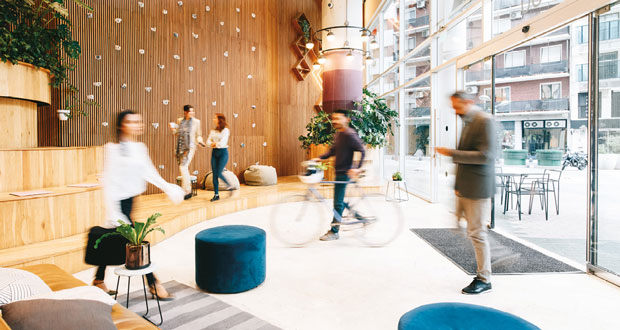We recently held a roundtable discussion under Chatham House rules, where members of the FMJ Editorial Steering Committee, representing both public and private sector organisations, discussed the big issues impacting in-house FMs
FMJ Editorial Steering Committee is made up of the client side FMs drawn from a range of sectors. The panel who came together for this discussion, represent a range of sectors, including legal, science, public sector and commercial. During the debate a range of topics were covered, including hybrid working patterns, the impact of tech on FM, recruitment challenges and managing costs. However, as the group acknowledged, their key driver remains supporting sustainable goals that aim to protect people, property and planet.
HYBRID CONUNDRUM
We kicked off the session on the continued impact hybrid working is having on the way workplaces are managed. As one participant remarked: “The overlap between the virtual environment and the physical environment shocked everyone during the pandemic, in particular the extent to which organisations could continue to function. It led to inevitable conversations around patterns of attendance in the post pandemic world.”
This has resulted in a reappraisal of what the workplace is for, which is not to sit at an office desk for eight hours a day but to embrace the surroundings as a place to exchange, to innovate, to brainstorm and to socialise. And it all comes back to the quality of the facilities.
A contributor described how staff want to be able to replicate their home set up. So, rather than just focusing on creating more collaborative spaces, there is a need to provide occupants with the kind of environment they’ve grown used to at home. “They want the ability to do their focus work, but they also want access to collaborative spaces. I think where the magic really comes is in making these spaces dual purpose, so you’re not fitting out lots of space for a particular purpose, if it’s only going to be used once a week or once a month.”
Workplaces are seeing a greater provision of team event spaces. Said a speaker: “A lot of what we’re looking at now is spaces to hold team events as well as standard meetings. I think the office space pre-COVID was primarily about desk-space, whereas now there are more themed areas. You’ve got your structured spaces, you’ve got your collaboration spaces, and you’ve got your event spaces as well.”
While all of the panel were looking at opportunities to revise their breakout spaces and introduce quiet working zones, in response, the furniture industry seems to have embraced the idea of providing individual workstations or ‘nooks’. Commented a panellist: “As occupants are willing to come back to the office – they want an alternative space from the desk, and talking to the furniture companies they are telling me that they’re not selling many desks but they’re selling lots of ‘nooks’.”
But what can employers do when dealing with staff who want to retain a fixed desk in the office despite working a third of the time at home? This is where a change management approach is essential to establish new ways of occupying space more effectively and efficient. Said a contributor: “We have to bring them along on the journey so I’m using pilot teams to demonstrate it can work. We’ll go through the pain, and we’ll test and we’ll learn. If it doesn’t work, then we’ll change it. Also, one of the things I’ve avoided doing is trying to answer everybody’s concerns right at the beginning. For instance, we’re not going to begin with a desk booking system, but if we find that we need it, then I’ve got one lined up.”
It was agreed that when it comes to managing the hybrid working estates, now more than ever for FMs, it’s a case of quality over quantity to help attract and retain talent.






